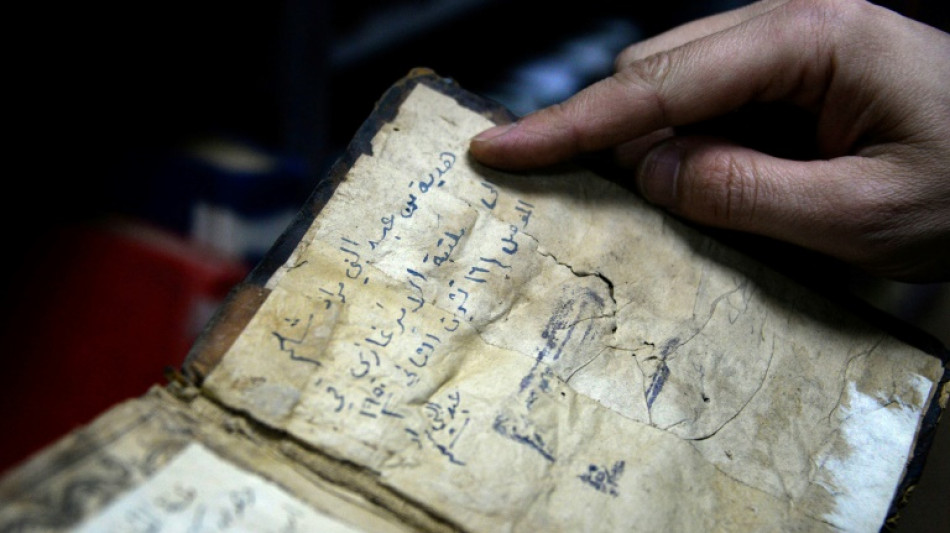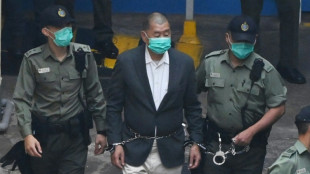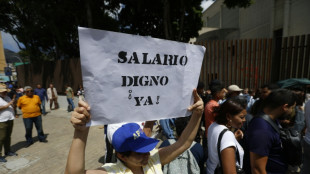
-
 Scotland spoil Italy's T20 World Cup debut with big win
Scotland spoil Italy's T20 World Cup debut with big win
-
Stocks track Wall St rally as Tokyo hits record on Takaichi win

-
 Israeli president says 'we will overcome evil' at Bondi Beach
Israeli president says 'we will overcome evil' at Bondi Beach
-
Munsey leads Scotland to 207-4 against Italy at T20 World Cup

-
 Venezuela's Machado says ally 'kidnapped' after his release
Venezuela's Machado says ally 'kidnapped' after his release
-
Japan restarts world's biggest nuclear plant again

-
 Bangladesh poll rivals rally on final day of campaign
Bangladesh poll rivals rally on final day of campaign
-
Third impeachment case filed against Philippine VP Duterte

-
 Wallaby winger Nawaqanitawase heads to Japan
Wallaby winger Nawaqanitawase heads to Japan
-
Thailand's Anutin rides wave of nationalism to election victory

-
 Venezuela's Machado says ally kidnapped by armed men after his release
Venezuela's Machado says ally kidnapped by armed men after his release
-
Maye longs for do-over as record Super Bowl bid ends in misery

-
 Seahawks' Walker rushes to Super Bowl MVP honors
Seahawks' Walker rushes to Super Bowl MVP honors
-
Darnold basks in 'special journey' to Super Bowl glory

-
 Japan's Takaichi may struggle to soothe voters and markets
Japan's Takaichi may struggle to soothe voters and markets
-
Bad Bunny celebrates Puerto Rico at Super Bowl, angering Trump

-
 Seahawks soar to Super Bowl win over Patriots
Seahawks soar to Super Bowl win over Patriots
-
'Want to go home': Indonesian crew abandoned off Africa demand wages

-
 Asian stocks track Wall St rally as Tokyo hits record on Takaichi win
Asian stocks track Wall St rally as Tokyo hits record on Takaichi win
-
Hong Kong sentences pro-democracy mogul Jimmy Lai to 20 years in jail

-
 Bad Bunny celebrates Puerto Rico in joyous Super Bowl halftime show
Bad Bunny celebrates Puerto Rico in joyous Super Bowl halftime show
-
Three prominent opposition figures released in Venezuela

-
 Japan PM Takaichi basks in historic election triumph
Japan PM Takaichi basks in historic election triumph
-
Israeli president says 'we shall overcome this evil' at Bondi Beach

-
 'Flood' of disinformation ahead of Bangladesh election
'Flood' of disinformation ahead of Bangladesh election
-
Arguments to begin in key US social media addiction trial

-
 Gotterup tops Matsuyama in playoff to win Phoenix Open
Gotterup tops Matsuyama in playoff to win Phoenix Open
-
New Zealand's Christchurch mosque killer appeals conviction

-
 Leonard's 41 leads Clippers over T-Wolves, Knicks cruise
Leonard's 41 leads Clippers over T-Wolves, Knicks cruise
-
Patriots-Seahawks Super Bowl approaches as politics swirl

-
 Trump says China's Xi to visit US 'toward the end of the year'
Trump says China's Xi to visit US 'toward the end of the year'
-
Real Madrid edge Valencia to stay on Barca's tail, Atletico slump

-
 Malinin keeps USA golden in Olympic figure skating team event
Malinin keeps USA golden in Olympic figure skating team event
-
Lebanon building collapse toll rises to 9: civil defence

-
 Real Madrid keep pressure on Barca with tight win at Valencia
Real Madrid keep pressure on Barca with tight win at Valencia
-
Dimarco helps Inter to eight-point lead in Serie A, Juve stumble

-
 PSG trounce Marseille to move back top of Ligue 1
PSG trounce Marseille to move back top of Ligue 1
-
Two prominent opposition figures released in Venezuela

-
 Hong Kong to sentence media mogul Jimmy Lai in national security trial
Hong Kong to sentence media mogul Jimmy Lai in national security trial
-
Lillard will try to match record with third NBA 3-Point title

-
 Vonn breaks leg as crashes out in brutal end to Olympic dream
Vonn breaks leg as crashes out in brutal end to Olympic dream
-
Malinin enters the fray as Japan lead USA in Olympics team skating

-
 Thailand's Anutin readies for coalition talks after election win
Thailand's Anutin readies for coalition talks after election win
-
Fans arrive for Patriots-Seahawks Super Bowl as politics swirl

-
 'Send Help' repeats as N.America box office champ
'Send Help' repeats as N.America box office champ
-
Japan close gap on USA in Winter Olympics team skating event

-
 Liverpool improvement not reflected in results, says Slot
Liverpool improvement not reflected in results, says Slot
-
Japan PM Takaichi basks in election triumph

-
 Machado's close ally released in Venezuela
Machado's close ally released in Venezuela
-
Dimarco helps Inter to eight-point lead in Serie A


In Iraq's Mosul, library rises from ashes of IS reign
The storied library of Iraq's Mosul University boasted a million titles before Islamic State group jihadists rampaged through it, toppling book shelves and burning ancient texts.
Now, almost five years after their defeat, the war-battered northern metropolis is trying to rebuild the pride of the city long known as a literature hub boasting countless booksellers and archives guarding rare manuscripts.
Mohamed Younes, technical director of the prestigious university library, recalls the carnage he witnessed after Mosul was recaptured from IS in mid-2017 following long and gruelling street battles.
"When we came back, we saw... the books pulled from the shelves, thrown on the ground and burned," he said.
Thousands of texts on philosophy and law, science and poetry which in some way contradicted the IS's extremist world view had gone up in flames.
Some of the most valuable titles were sold on the black market.
"Before, we had more than a million titles, some of which couldn't be found in any other university in Iraq," said Younes.
When the jihadists were first at the gates of the city, he said, "we were only able to move the rare books and a number of foreign periodicals".
With the IS group's brutal takeover of Mosul, 85 percent of the collection was lost.
Before IS, Mosul University was "the mother of all books," said former student Tarek Attiya, 34, who is now enrolled at Tikrit university.
"There is a huge difference between what used to be and the situation after IS," he said.
- Refurbished building -
Now there is a revival going on to, with the help of donations, slowly line the library shelves with books again.
The library building, refurbished with financing from a UN agency, is set to reopen this month. Four floors high with a sleek glass exterior, it will have an initial 32,000 books.
It will also feature a digital trove of e-books, with a view to eventually rebuilding a million-strong collection.
Ahead of the opening, the books have been housed in the narrow premises of the university's engineering faculty where shelves are overflowing and titles are stacked on every available surface.
Significant donations from Arab and international universities have been received to "enable the revival of the library," said the director.
Renowned figures in Mosul and across Iraq have also contributed by "dipping into their personal" collections, he added.
The northern metropolis of Mosul has historically been a hub for merchants and aristocrats, with a rich cultural and intellectual life.
A commercial crossroad of the Middle East, Mosul was able to preserve thousands of rare and ancient works, notably religious texts.
Iraq's first printing press was operating in Mosul in the second half of the 19th century.
- Appetite for reading -
Signs of Mosul's fledgling cultural revival have begun to take root -- at least where there was anything left to save.
The library of the Waqf, the state body that manages Islamic endowments, once contained manuscripts dating back 400 years, said its head, Ahmed Abd Ahmed.
But, he added sadly, "they have all disappeared".
Elsewhere in the city, Al-Nujaifi street, historically lined with booksellers, still bears the scars of destruction wrought by the jihadists.
Many shops are abandoned, and mounds of rubble lay under old stone arches -- but a handful of shopkeepers have reopened their doors after paying out of pocket for restoration work.
Mosul's central public library -- which was founded a century ago last year, and had boasted more than 120,000 titles -- reopened its doors in late 2019, after restoration.
"We lost 2,350 books on literature, sociology or religion," said its director Jamal al-Abd Rabbo.
But he added that public donations and purchases had allowed him to rebuild the collection up to 132,000 titles.
Old leather-bound books with worn spines and creased pages still line the library's shelves.
Crucially, the public's appetite for literature remains unbroken, he said, and "some of our visitors come daily, for an hour or two, to read".
T.Ibrahim--SF-PST




